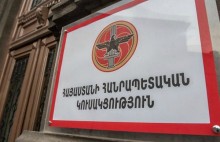Speeches
STATEMENT OF THE EXECUTIVE BODY OF THE REPUBLICAN PARTY OF ARMENIA REGARDING THE DELIMITATION PROCESS STARTED BETWEEN ARMENIA AND AZERBAIJAN
22.04.2024

The agreements reached as a result of the meeting of the border demarcation commissions between Armenia and Azerbaijan on April 19, 2024 prove that the Armenian authorities continue their policy of capitulation under the threat of force, which raises serious concerns about the security and existence of our country.
According to this agreement, the demarcation of Baghanis, Voskepar, Kirants, and Berkaber settlements with Azerbaijan will be considered final, regardless of the completion of the further demarcation process of the entire border. This means that territories of strategic importance, currently under the control of the Armed Forces of the Republic of Armenia, will come under the control of Azerbaijan. In the area of these four villages, our armed forces will withdraw and give way to Azerbaijani border guard troops. Additionally, vital infrastructures for the local population will come under Azerbaijani control. It is noteworthy that the Armenian authorities make this unilateral concession despite Azerbaijan has repeatedly stated that it is not going to leave the territories occupied from the Republic of Armenia.
Such partial delimitation is unacceptable, as it represents unilateral concessions to the Azerbaijani side. The border demarcation process should begin not with actual territorial changes, but with the decision on the demarcation order of all parts of the border, their demarcation, and only after that, the transfer of demarcation on the terrain.
Azerbaijan has clearly stated that after resolving this issue, it will address the return of the so-called enclaves. It is obvious that the current authorities will also hand over those territories (which legally belong to the Republic of Armenia) to Azerbaijan with the same "justification." In the Tavush area, this will mean that border villages will be surrounded by Azerbaijan, with all the disastrous consequences.
The Armenian authorities are trying to present their capitulation step as a success, referring the clause of the agreement according to which the parties will be guided by the 1991 declaration of Alma Ata in the demarcation process. This is a misleading statement, because the text of the same agreement mentions that other regulations may be provided for in the future peace agreement. The Azerbaijani side has never hidden that it will be guided not by international law, but by the principle of "justice" in the border demarcation process.
International practice shows that border optimization is crucial in the demarcation process, aiming to create conditions for the traditional economic activities of border settlements residents, the operation of existing transport, improvement, communal infrastructures, and the preservation of religious objects. It is evident that the policy adopted by the Armenian authorities will undermine these vital values for the population.
Despite Nikol Pashinyan's assertion that Azerbaijan will initiate a war against Armenia if the territory under Armenian control is not handed over, the West greeted the agreements reached at the April 19 meeting with undisguised delight. It is abundantly clear that such a process cannot lead to the establishment of a just and stable peace between the two countries.
According to the press release on the 19.04.2024 meeting of the Armenian and Azerbaijani border demarcation commissions, minutes were signed as a result of the meeting, but its text was not published.
The position of the RPA regarding processes related to delimitation is clearly expressed in the statement of the opposition factions recently presented to the National Assembly, which was rejected by the ruling faction.
1 The demarcation and delimitation between the Republic of Armenia and the Republic of Azerbaijan must comply with the best international practices and norms and must be based on the United Nation’s "Vienna Convention on the Law of Treaties" (1969), the "Helsinki Final Act" (1975), and the OSCE Secretariat's "Delimitation and Demarcation of State Boundaries: Challenges and Solutions" (2017) from the conceptual norms of the document, including the fundamental principle that any international agreement reached by the threat or use of force is invalid.
2 The demarcation and delimitation between the Republic of Armenia and the Republic of Azerbaijan can be carried out in conditions of an atmosphere of trust, the most important prerequisites for the formation of which are the withdrawal of Azerbaijani troops from the sovereign territory of the Republic of Armenia, the termination of aggression by Azerbaijan, the return of all prisoners of war, the resolution of existing humanitarian issues, and cultural heritage preservation. Moreover, delimitation and demarcation between the Republic of Armenia and the Republic of Azerbaijan cannot in any way limit the right of the people of Artsakh to collectively return to Nagorno Karabakh under international guarantees, as well as predetermine the final status of Artsakh (Nagorno Karabakh).
